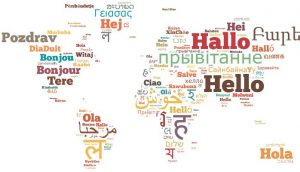Every year, hundreds of new words and phrases that come from internet slang are added to the dictionary.
Some of them are abbreviations, like FOMO (Fear Of Missing Out) and YOLO (You Only Live Once). Others are words that have been stretched into more parts of speech than originally intended — like when “trend” became a verb (“It’s trending worldwide”). Others still have emerged as we adapt our language to new technologies; think “crowdfunding,” “selfie,” “cyberbullying.”
 You might notice how many of these “new” words are actually just appropriated, meaning they are pre-existing words that are combined or given entirely new meanings. For example, “social network” became a word in the Oxford English Dictionary back in 1973, referring to the physical activity of networking in a social atmosphere. In the 1990s, people began using the term to refer to virtual engagement, and that became an official definition in 1998.
You might notice how many of these “new” words are actually just appropriated, meaning they are pre-existing words that are combined or given entirely new meanings. For example, “social network” became a word in the Oxford English Dictionary back in 1973, referring to the physical activity of networking in a social atmosphere. In the 1990s, people began using the term to refer to virtual engagement, and that became an official definition in 1998.
For Theme Thursday this week we think about the evolution of language.
Slang and Sociability: In-Group Language among College Students by Connie Eble
Slang from Shakespeare: Together with literary expressions, compiled by Anderson M. Baten
Dictionary of Afro-American slang by Clarence Major
Green’s dictionary of slang, by Jonathon Green
The Oxford dictionary of modern slang, by John Ayto and John Simpson
The seeds of speech: Language origin and evolution, by Jean Aitchison
Eve spoke: Human language and human evolution, by Philip Lieberman
Tools, language, and cognition in human evolution, edited by Kathleen R. Gibson and Tim Ingold
The ape that spoke: Language and the evolution of the human mind, by John McCrone
Interested in more? Watch this series, available through Kanopy. Speaking in Tongues: The History of Language is a 5 part series. Currently there are more than 6,000 languages spoken around the world. This five-part series traces the history and evolution of language and attendant theories and controversies while evaluating the scope of linguistic diversity, the dissemination of language, the expansion of language into written form, and the life cycle of language. Prominent figures in the field of linguistics–Noam Chomsky, John McWhorter, and Peter Ladefoged, to name only three–are featured.
